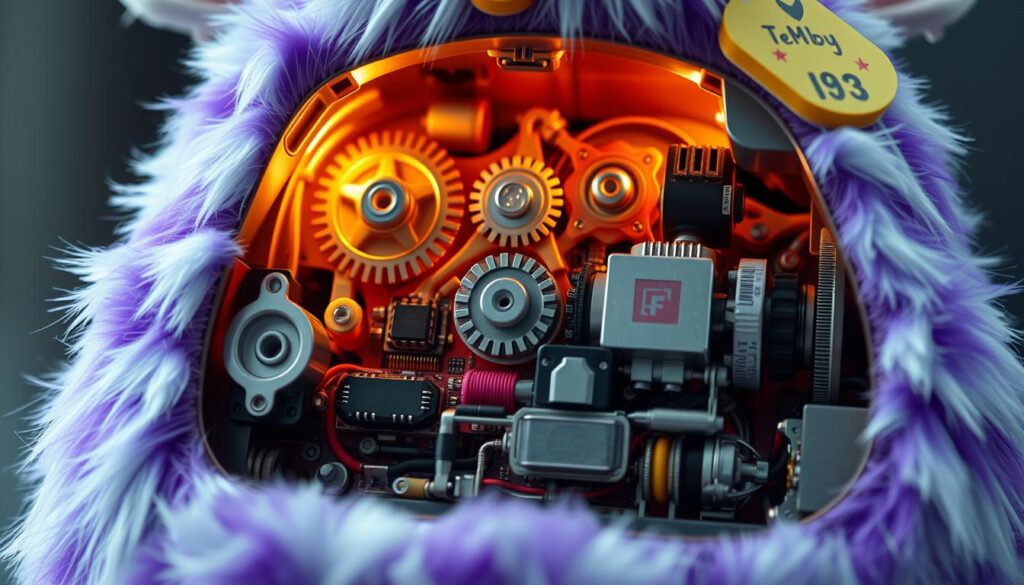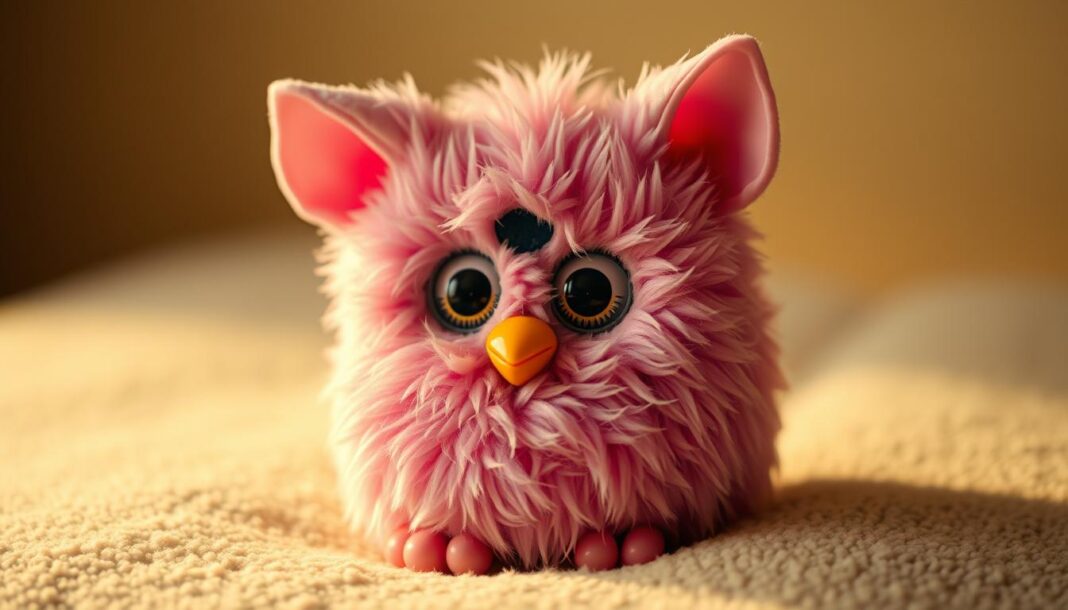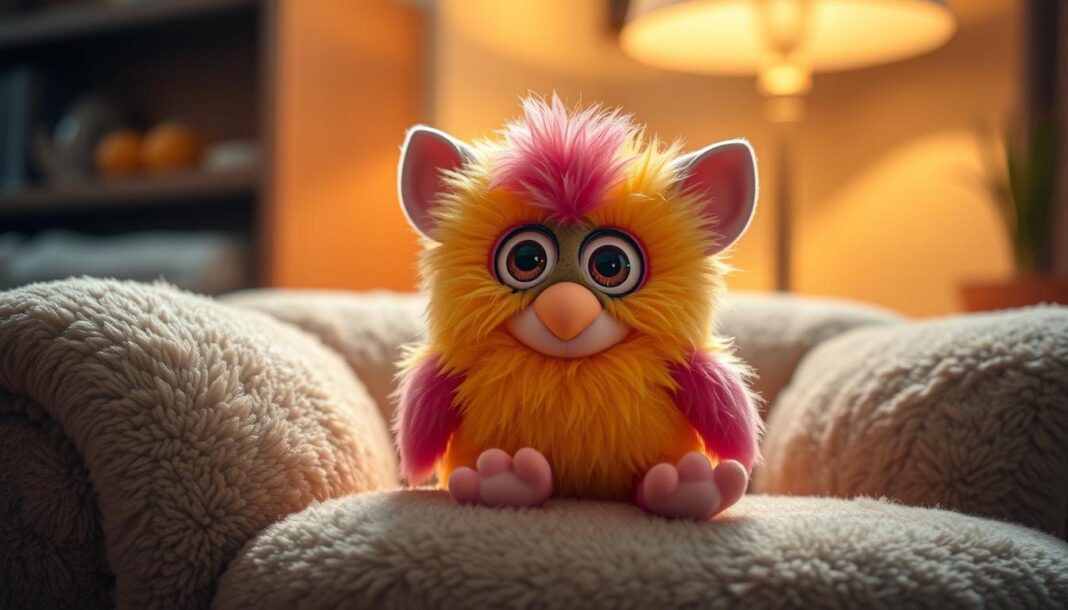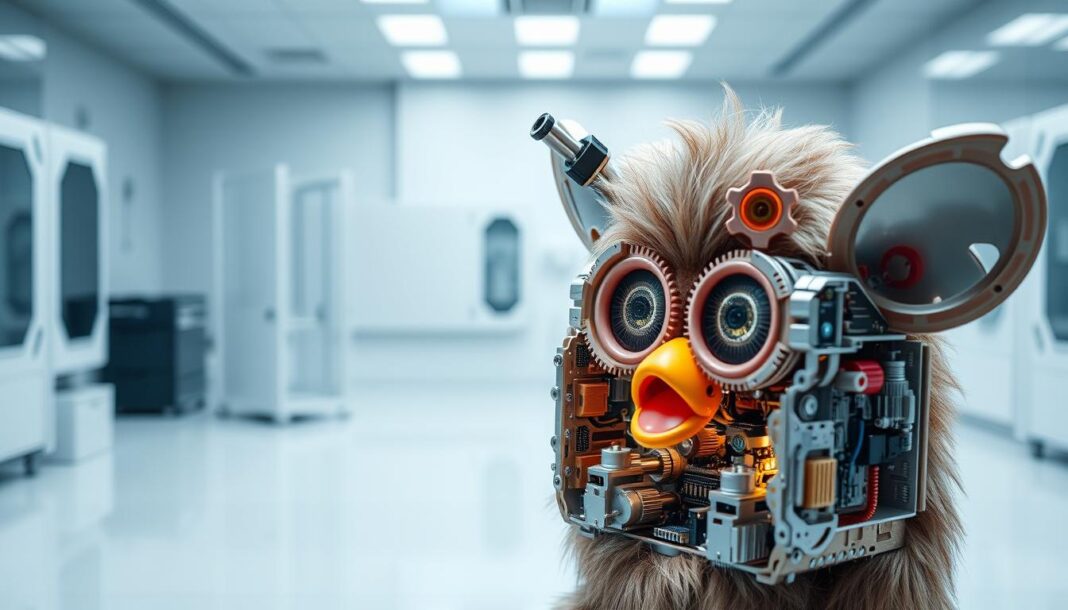The original Furby was more than just a toy; it was a cultural phenomenon that captivated children and adults alike in the late 1990s. As a fan of electronic pets, we can’t help but reminisce about the iconic Furby that started it all.
Launched in the holiday season of 1998, this interactive creature quickly became a must-have item, with over 40 million units sold during its original production run. Fans of the Furby line gave their electronic pets a name and personality, showcasing the toy’s ability to engage and interact with its owners. The original Furby’s innovative features, including its ability to “learn” English, set the stage for future editions and versions.
For those who experienced the magic of the original Furby, or for those who are simply curious about this nostalgic toy, our comprehensive guide will take you on a journey through the creation, features, and cultural impact of this beloved electronic pet. You can also read more about the long Furby experience and what makes it special.
The Birth of a Cultural Phenomenon
The 1998 Furby was more than just a toy; it was a cultural phenomenon that captured the hearts of many. Its creation and development are a testament to innovative toy design and strategic marketing.
Creation and Development by Dave Hampton and Caleb Chung
Dave Hampton and Caleb Chung spent a total of 18 months designing and creating the original Furby. Their innovative approach to interactive toy design laid the foundation for the Furby’s success. After two unsuccessful attempts at licensing the concept, they partnered with Richard C. Levy, who brought the Furby to Tiger Electronics.
Roger Shiffman, a key figure at Tiger Electronics, recognized the toy’s potential and bought the rights to it. This partnership was crucial in bringing the Furby to the market.
The Debut at the 1998 American International Toy Fair
The Furby made its first public appearance at the 1998 American International Toy Fair, generating significant buzz among retailers and fans. This debut was a critical step in building anticipation for the toy’s release.
Tiger Electronics and the Official Launch
On October 2, 1998, the Furby was officially launched, retailing for $30-$35. The Furby line quickly became a must-have item during the holiday season. Tiger Electronics positioned and marketed the Furby effectively, creating a comprehensive guide to caring for these electronic pets, which captivated children and adults for years to come.
For more insights into the original Furby and its impact, visit our detailed guide on the Furby toy.
What Made the 1998 Furby Special
The original Furby, launched in 1998, was more than just a toy; it was an interactive experience that combined cutting-edge technology with a unique ability to adapt and learn. This electronic creature was designed to interact with its user, creating a bond that was new and exciting at the time.
Innovative Technology for Its Time
The 1998 Furby boasted adaptive language learning capabilities, allowing it to transition from speaking Furbish to English as it “learned” from user interactions. This was made possible by its advanced technology, including light sensors, touch sensors, and a complex system of movements powered by a single motor and a camshaft gear assembly.
![]()
The Furbish Language and Learning Capabilities
One of the Furby’s most fascinating features was its ability to communicate in Furbish, a language consisting of 42 different words that could form hundreds of phrases. Each Furby was given one of 24 possible Furbish names, which it would reveal when prompted correctly by the user, such as by rubbing its tummy sensor three times and then petting its back.
Physical Features and Interactive Elements
The Furby’s appeal was also due to its physical features, including its soft, artificial fur that came in various colors and its expressive moving eyes that could convey different emotions. The combination of fur colors, voice pitches, and eye colors resulted in over 1000 unique Furby combinations, making each one distinct.
The Personality and “Growth” of Furby
1998 Furbys were known for their gentle and friendly personality, though their moods could be influenced by their surroundings. They were designed to love singing and being played with, and it was rare for one to show hostility. The Furby’s personality would develop over time through a series of programmed stages, creating the illusion of growth and learning that made each user’s experience feel unique and personal.
The Original 1998 Furby Lineup
The initial release of the Furby in 1998 marked the start of an extensive and varied product line. Over time, the Furby evolved through multiple generations, each bringing new colors, designs, and features to the table.
Eight Generations of Standard Furbys
The standard Furby line went through eight distinct generations, with each generation introducing new colors and slight design variations. This progression kept the toy fresh and exciting for consumers.
| Generation | Notable Features | Colors |
|---|---|---|
| 1st | Original Design | Basic Colors |
| 2nd to 8th | Varied Designs, New Features | Expanded Color Palette |
Special Editions and Limited Releases
Beyond the standard line, special editions and limited releases were created for specific events or contests, making them highly sought after by collectors. These unique Furbys added to the diversity of the lineup.
Fresh New Look Furbys
Some Furbys were re-released with a “Fresh New Look” label, featuring slight modifications to their designs. These updates gave the classic Furby a new appeal.
Unreleased Prototypes and Rarities
Interestingly, there were prototypes of Generation 9 and 10 Furbys, as well as other unreleased designs, which are now considered rare collector’s items. For more insights into unique Furby editions, you can explore the white Furby features and.
The Furby community also developed nicknames for different models, such as “Sunrise Furby” and “Tuxedo Furby,” creating an informal classification system.
Furby Mania: The Holiday Craze of 1998-1999
Furby mania reached its peak during the 1998-1999 holiday season, with the toy becoming a cultural sensation. The demand for Furbys was unprecedented, leading to widespread shortages and a thriving resale market.
Unprecedented Demand and Retail Shortages
The 1998 holiday season saw an extraordinary demand for Furbys, with the toys flying off the shelves and creating retail shortages across the country. This made it a challenging task for many parents to purchase the toy for their children.
Resale Market and Inflated Prices
The scarcity of Furbys led to a booming resale market, where prices soared from the retail price of $35 to hundreds of dollars. Some enthusiastic fans were willing to pay up to $300 for the must-have toy of the season.
Media Coverage and Cultural Impact
The Furby craze received extensive media coverage, making it not just a toy but a cultural phenomenon that dominated news cycles. For more information on the Furby’s cultural impact, visit Wikipedia’s Furby page.
The Security Concerns and NSA Ban
Surprisingly, the Furby’s popularity was also marred by security concerns, leading to its ban by the Pentagon, NSA, and Norfolk Naval Shipyard in 1999. As discussed on Antonio’s of Beacon Hill, the concern was that Furbys might record sensitive information.
In conclusion, the Furby phenomenon was a significant event in the toy industry, with over 40 million units sold in its first two years. The toy’s impact was felt across various sectors, from retail to security agencies.
Furby Friends and Extended Family
Beyond the original Furby, the brand released several new characters and interactive companions, expanding the Furby universe and delighting fans worldwide.
The Evolution with Furby Babies
In 1999, the Furby family welcomed a new addition: Furby Babies. These smaller, endearing creatures had higher voices and couldn’t dance like their adult counterparts, but they quickly charmed fans by switching to English more rapidly. Furby Babies came in an impressive 24 different colors, each with white eyelashes and one of six eye colors, offering a wide variety for fans to collect.
Shelby and Other Companions
In 2001, “Shelby,” a clam-like friend of Furby, was introduced. Shelby boasted improved memory and a distinct personality while maintaining the ability to communicate with the original Furbies and Furby Babies. This innovation further enriched the Furby experience, showcasing the brand’s commitment to creativity and interaction.
Licensed Character Furbys
The Furby series also embraced beloved characters from popular culture, releasing Furby-style versions of Gizmo from “Gremlins,” Yoda from “Star Wars,” and E.T. These licensed character Furbys brought a new dimension to the franchise, appealing to fans of both the Furby and the original characters. For more insights on interactive toys and their impact on families, visit Understanding Furby: Expert Insights for Families.
Communication Between Furby Products
One of the most fascinating aspects of the Furby series was its ability to facilitate communication between different products through infrared technology. This feature allowed for a connected play experience, setting the stage for future innovations in interactive toys.
| Product | Release Year | Key Features |
|---|---|---|
| Furby Babies | 1999 | Smaller size, higher voices, quicker English language adoption |
| Shelby | 2001 | Clam-like design, improved memory, unique personality |
| Licensed Character Furbys | Various | Gizmo, Yoda, E.T. versions with Furby functionality |
Technical Aspects of the 1998 Furby
Delving into the 1998 Furby’s technical aspects, we uncover a world of innovative engineering that captivated a generation. The Furby’s internal hardware and software worked in harmony to create an interactive experience like no other.
Inside the Furby: Hardware and Programming
The original Furby was powered by a 6502-style Sunplus SPC81A microcontroller, boasting 80 KiB of ROM and 128 bytes of RAM. Its source code was written in assembly language for the 6502 microprocessor, showcasing efficient programming that maximized limited resources. For more details on the original Furby, visitAntonio’s of Beacon Hill.
The 6502 Microprocessor and Memory Capabilities
The 6502-style microcontroller was the brain of the Furby, controlling its various functions. Although it differed from the original 6502 in the lack of the Y index register, it still provided sufficient processing power for the Furby’s operations.
Voice Synthesis and Sensory Systems
The Furby’s voice synthesis was made possible by the TSP50C04 chip from Texas Instruments, which implemented linear predictive coding to create its distinctive voice. The Furby could speak both Furbish and gradually introduce English words, captivating its users. A simple electric motor and a system of cams and gears controlled the Furby’s physical movements, including closing itseyesand mouth, raising its ears, and creating a simulation of mobility.

Common Technical Issues and Troubleshooting
Despite its innovative technology, the Furby was not immune to technical misconceptions.Roger Shiffman, the owner of Tiger Electronics, clarified that the Furby had “absolutely no ability to do any recording whatsoever,” debunking security concerns that led to its ban in certain government facilities. As a fan of the Furby, it’s essential to understand its technical capabilities and limitations, giving it anameand personality that endeared it to many.
By understanding the technical aspects of the 1998 Furby, we can appreciate the ingenuity that went into creating this beloved toy, with its uniqueeye colorand interactive features that delighted users of all ages.
The Enduring Legacy of the Original Furby
As we reflect on the Furby phenomenon, it’s clear that its influence extends far beyond its initial release. The original 1998 Furby has undergone numerous transformations over the years, with subsequent generations introducing new features and technologies.
The Furby line has evolved significantly, from the 2005 Emoto-Tronic Furby to the 2012 Furby with “A Mind Of Its Own,” and more recently, the Furby Boom and Furby Connect series. Each new release has built upon the design elements and interactive features established by the original, while incorporating technological innovations that reflect the changing digital landscape.
The introduction of Furby Babies, Furby Furblets, and various special editions has kept the brand fresh and relevant across multiple generations of fans. The original 1998 Furby’s legacy is a testament to its innovative design and technological advancements, influencing toy design for over 25 years and cementing Furby’s place as one of the most recognizable toy brands in modern history.


